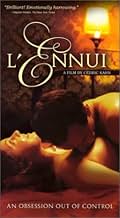L'ennui
- 1998
- 2h 2min
Martin es profesor de filosofía en medio de una crisis de la mediana edad. Sin rumbo ni propósito en su vida, inicia un romance con Cécilia, una joven modelo de artista que podría haber mata... Leer todoMartin es profesor de filosofía en medio de una crisis de la mediana edad. Sin rumbo ni propósito en su vida, inicia un romance con Cécilia, una joven modelo de artista que podría haber matado a su ex amante.Martin es profesor de filosofía en medio de una crisis de la mediana edad. Sin rumbo ni propósito en su vida, inicia un romance con Cécilia, una joven modelo de artista que podría haber matado a su ex amante.
- Dirección
- Guionistas
- Elenco
- Premios
- 1 premio ganado y 5 nominaciones en total
Opiniones destacadas
While the three main roles are more than adequately filled by Charles Berling, Sophie Guillemin and Arielle Dombasle, the surfeit of pretentious talk wears the film down and soon grows tiresome (even to hardened art-house film addicts like myself). The main reason to keep watching (apart from the copious sex scenes, of course) is to follow Berling's gradual deterioration from a merely curious seeker of a casual sexcapade to fully-fledged manic depressive. Having a teenaged, plump ugly duckling as the object of his desire has some novelty value, but ultimately her character is so distant and self-centered that one cannot fully empathize with Berling's plight. Also, I haven't read the novel myself but the (relative) happy ending seems misjudged. The vaguely surreal dinner sequences where Berling is introduced to the girl's parents as her music teacher (especially those scenes featuring her cancer-ridden, speech-impaired father) ironically offer a respite from all the glumness but, in retrospect, seem to belong to a totally different film.
Italian film director Damiano Damiani had previously adapted the same source material for the screen as LA NOIA aka THE EMPTY CANVAS (1963) which starred Horst Buchholz, Catherine Spaak and Bette Davis (as Buchholz' mother!), a role which was omitted completely by Cedric Kahn for his modern version. I haven't watched the Damiani film but I would certainly like to, especially since it features a good cast: besides those already mentioned, Isa Miranda, Georges Wilson and Daniela Rocca, also appear.
That's what happens in 'L'Ennui' -- characters driven by excess, searching for the unsearchable or the unreachable. The ambiguity of the word 'ennui' fits very well: in English translation, the word can mean not only boredom but also human emptiness. This is what I believe director Cedric Kahn was aiming for, and he's certainly on target.
This is a descent into an obsessive abyss by Martin, played by Charles Berling with such frenetic neuroticism that he all but leaps off the screen. He lives and suffers through the lives of others. He meets Cecilia, a 17-year-old artist's model, stunningly portrayed by Sophie Guilleman. Martin asks questions about the artist, who died shortly after an obsessive love affair with Sophie. Despite his extensive intellectual training in philosophy (a Moravia-Kahn 'in-joke' here), Martin cannot fathom the emotional emptiness of Cecilia, who is a character straight out of, well, the existential literature of Moravia and Camus (Cecilia reminded me of the latter's Mersault in 'L'Etranger,' a classic study of human detachment).
Martin asks Cecelia endless questions about emotional matters, but she cannot answer them. She only understands transient forms of pleasure (never 'happiness'), and her laissez-faire attitude drives Martin into increasing levels of madness. He thinks he loves her, but he has no understanding of love at all, and cannot find the centre of Cecilia's amiable indifference. He screams about 'possessing' her, as if she were a commodity. She neither loves nor hates him; she is simply neutral, which Martin cannot grasp.
This is a brilliant work on a difficult subject, although it's perhaps about 20 minutes too long. Slowly and meticulously, Kahn unpeels the layers of the endless human dilemma called love.
Once again, the French have delivered a film that just wouldn't see the light of day in Hollywood. I can hear the producers in LaLaLand now: who wants to pay for a film that focuses on a basic philosophical problem: the nature of human existence? Fortunately, we can still see these kinds of films, but they'll never come from Hollywood.
¿Sabías que…?
- TriviaSophie Guillemin's debut.
- Citas
Sophie: Abstinence is turning you sour; give it up.
Martin: I have.
Sophie: Really? Do I know her?
Martin: No, I met her in odd circumstances a few weeks ago.
Sophie: Really? You must be pleased.
Martin: You're quite wrong, I don't like her at all. She's totally uninteresting. I'm trying to get rid of her.
Sophie: Why? Is she ugly?
Martin: Not particularly.
Sophie: Is she stupid then?
Martin: No. Not at all. She never says anything stupid. It's complicated. She bores me. I have no contact with her. Or rather only physical contact.
Sophie: Why complain? That's not so bad.
Martin: You can't imagine how basic she is, she has no conversation. When she speaks, she sounds silent. Her only means of expression is sexual.
- ConexionesReferences Jade (1988)
- Bandas sonorasMelao de Cana
Performed by Celia Cruz with Sonora Matancera (as La Sonora Matancera)
Written by Hippolita Pedroso
Edition Originale EDITORA MUSICAL DE CUbA
Sous éditions J. GARZON
© DECLIC
Selecciones populares
- How long is Boredom?Con tecnología de Alexa
Detalles
Taquilla
- Total en EE. UU. y Canadá
- USD 36,666
- Fin de semana de estreno en EE. UU. y Canadá
- USD 14,064
- 10 oct 1999
Contribuir a esta página


























